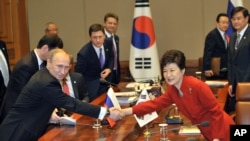A proposed trade route linking both Koreas with Europe is set to top the agenda at a Wednesday meeting between Russian President Vladimir Putin and his South Korean counterpart.
The Russian president's talks with President Park Geun-hye were not expected to yield a breakthrough on the politically challenging, Moscow-led plan, referred to by some as the "Iron Silk Road."
The proposal involves linking up the rail networks of North and South Korea, and connecting them to the Trans-Siberia Railway, the world's longest railroad that connects Russia's east and west.
It would also call for the development of North Korea's port city of Rajin, making it a hub for exports from the Korean peninsula.
The plan faces several challenges, including the rocky nature of North-South relations and the many economic sanctions imposed on Pyongyang because of its nuclear weapons program.
Such concerns have made even some less ambitious joint Korean business ventures difficult to manage. This includes the Kaesong industrial complex, which the North shut down for five months following international condemnation of its nuclear test in February.
Even still, some in South Korea have shown interest in participating. If there were enough interest, South Korean authorities would seemingly need to lift a law banning investment in North Korea that was passed following Pyongyang's sinking of a South Korean warship in 2010.
Despite the many obstacles to the project, Russia has moved forward with what it considers the first part of the plan. In September, it opened a 54-kilometer railway linking its southeast city of Khasan to the North Korean port of Rajin.
Meanwhile, Russian President Vladimir Putin attended the 6th Korea-Russia Business Dialog on Wednesday between South Korean and Russian business leaders, where he called for closer economic ties between the two nations.
Putin arrived in Seoul earlier in the day and was accompanied by several ministers and officials on his one day state visit.
The sixth Korea-Russia Business Dialog was Putin's first official scheduled meeting during his visit to Seoul. About 250 businessmen from the two countries attended the conference.
“South Korea's trade volume with Russia is smaller than the one with the United States, Japan and China. It is true that the trade volumes of the United States, Japan and China are big. In spite of that, I'm confident that we can multiply the bilateral trade volume. We can make cooperation in many sectors,” Putin said at the conference.
He also said the two countries are making progress on improving bilateral cooperation to advance mutual interests.
“South Korea's business community can play an important role in this area [promoting Asia-Pacific investment]. We have exchanged an initiative on the investment promotion. The Russian Direct Investment Fund and the Korea Investment Corporation agreed to make a billion-dollar investment platform,” said Putin.
The business dialog was founded in 2008 as an official channel of communication between South Korean and Russian companies to promote economic cooperation.
The Russian president's talks with President Park Geun-hye were not expected to yield a breakthrough on the politically challenging, Moscow-led plan, referred to by some as the "Iron Silk Road."
The proposal involves linking up the rail networks of North and South Korea, and connecting them to the Trans-Siberia Railway, the world's longest railroad that connects Russia's east and west.
It would also call for the development of North Korea's port city of Rajin, making it a hub for exports from the Korean peninsula.
The plan faces several challenges, including the rocky nature of North-South relations and the many economic sanctions imposed on Pyongyang because of its nuclear weapons program.
Such concerns have made even some less ambitious joint Korean business ventures difficult to manage. This includes the Kaesong industrial complex, which the North shut down for five months following international condemnation of its nuclear test in February.
Even still, some in South Korea have shown interest in participating. If there were enough interest, South Korean authorities would seemingly need to lift a law banning investment in North Korea that was passed following Pyongyang's sinking of a South Korean warship in 2010.
Despite the many obstacles to the project, Russia has moved forward with what it considers the first part of the plan. In September, it opened a 54-kilometer railway linking its southeast city of Khasan to the North Korean port of Rajin.
Meanwhile, Russian President Vladimir Putin attended the 6th Korea-Russia Business Dialog on Wednesday between South Korean and Russian business leaders, where he called for closer economic ties between the two nations.
Putin arrived in Seoul earlier in the day and was accompanied by several ministers and officials on his one day state visit.
The sixth Korea-Russia Business Dialog was Putin's first official scheduled meeting during his visit to Seoul. About 250 businessmen from the two countries attended the conference.
“South Korea's trade volume with Russia is smaller than the one with the United States, Japan and China. It is true that the trade volumes of the United States, Japan and China are big. In spite of that, I'm confident that we can multiply the bilateral trade volume. We can make cooperation in many sectors,” Putin said at the conference.
He also said the two countries are making progress on improving bilateral cooperation to advance mutual interests.
“South Korea's business community can play an important role in this area [promoting Asia-Pacific investment]. We have exchanged an initiative on the investment promotion. The Russian Direct Investment Fund and the Korea Investment Corporation agreed to make a billion-dollar investment platform,” said Putin.
The business dialog was founded in 2008 as an official channel of communication between South Korean and Russian companies to promote economic cooperation.











